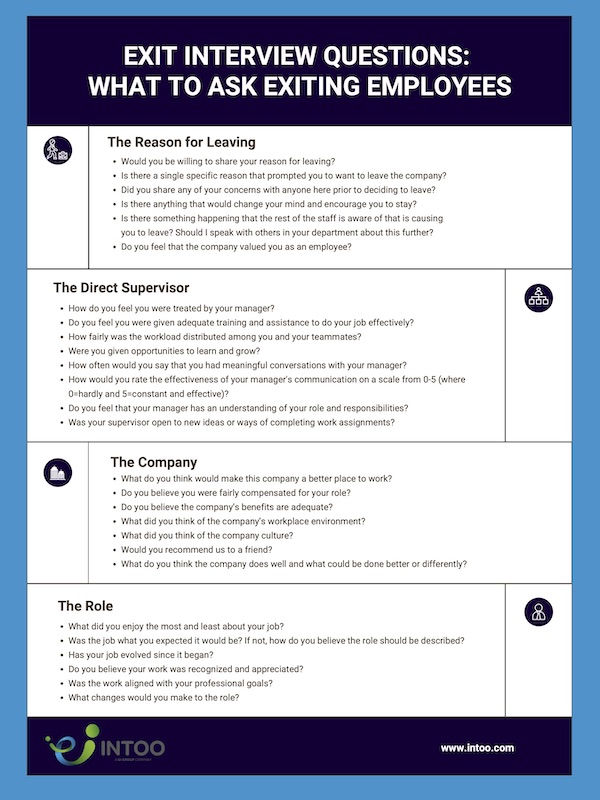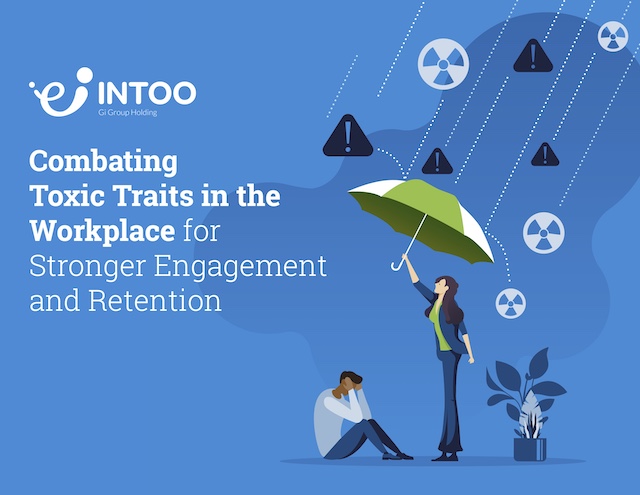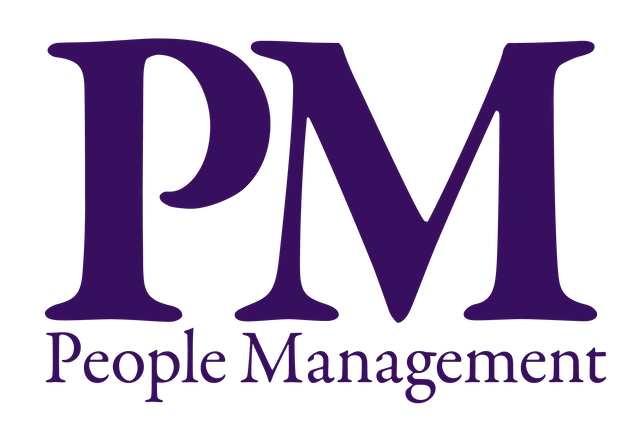Exit interviews can help an organization learn what it’s doing right and wrong from the employee’s perspective. During the Great Resignation, this is especially important in order to make corrections to increase employee satisfaction and reduce attrition. A negative employee experience can affect the company not only in terms of turnover costs and internal morale, but also in terms of employee brand. While you get the feedback during the interview, potential candidates to refill the role may get it via sites such as Glassdoor. Therefore, it’s essential to carefully consider the employee’s responses in order to prevent further resignations and to protect your employer brand.
But what exit interview questions should you ask?
Exit interview questions fall into a few categories. What you ask may depend on whether you’ve preceded the meeting with an exit interview questionnaire, which could streamline the meeting by helping you to focus on specific follow-up questions. You may decide to use the information in this article to help you create a questionnaire or to guide you during the interview itself. Either way, questions usually fall into these four categories:
- The reason for leaving: Whether anything specific prompted the employee to want to leave the company
- The supervisor: The employee’s relationship with the direct manager
- The company: How the employee feels about the company in general, as well as specifically about benefits, compensation, and opportunities for growth
- The role: What responsibilities did the employee have and the specifics about the employee’s satisfaction or dissatisfaction with the job
Download a printable version of this list of questions.
Exit Interview Questions
Using the categories listed above, here are some questions you might ask during the meeting. While not all of these questions may be applicable to the employee, including at least one from each category is important to get a 360° view of the employee’s experience at the company.
The Reason for Leaving
Employees can have many different reasons for deciding to leave. Dissatisfaction with the work itself, a lack of growth, or widespread poor morale are just a few. But sometimes a tempting role is brought to an employee who wasn’t even looking to leave. This is why it’s important to ask these questions.
- Would you be willing to share your reason for leaving?
- Is there a single specific reason that prompted you to want to leave the company?
- Did you share any of your concerns with anyone here prior to deciding to leave?
- Is there anything that would change your mind and encourage you to stay?
- Is there something happening that the rest of the staff is aware of that is causing you to leave? Should I speak with others in your department about this further?
- Do you feel that the company valued you as an employee?
The Direct Supervisor
These questions can help you support management by providing encouragement in the case of positive feedback, or correction if the feedback is negative.
- How do you feel you were treated by your manager?
- Do you feel you were given adequate training and assistance to do your job effectively?
- How fairly was the workload distributed among you and your teammates?
- Were you given opportunities to learn and grow?
- How often would you say that you had meaningful conversations with your manager?
- How would you rate the effectiveness of your manager’s communication on a scale from 0-5 (where 0=hardly and 5=constant and effective)?
- Do you feel that your manager has an understanding of your role and responsibilities?
- Was your supervisor open to new ideas or ways of completing work assignments?
The Company
Feedback on how the company is doing from the employee’s perspective can help you improve the employee experience for your entire workforce. Taking action can help you attract and retain talent, and improve your employer brand.
- What do you think would make this company a better place to work?
- Do you believe you were fairly compensated for your role?
- Do you believe the company’s benefits are adequate?
- What did you think of the company’s workplace environment?
- What did you think of the company culture?
- Would you recommend us to a friend?
- What do you think the company does well and what could be done better or differently?
The Role
Before you can consider refilling the role, you need to know what did and didn’t work for the employee who is leaving it. Sometimes changes to responsibilities, job level, reporting structure, or other are required. You may find that this single role should now be two, or—in the case where the employee didn’t have enough work—that the responsibilities could be shared among those remaining on the team. If you do need to rehire, you’ll want to reduce chances of further turnover by making sure the job description is accurate and that the role will be satisfying for the candidate.
- What did you enjoy the most and least about your job?
- Was the job what you expected it would be? If not, how do you believe the role should be described?
- Has your job evolved since it began?
- Do you believe your work was recognized and appreciated?
- Was the work aligned with your professional goals?
- What changes would you make to the role?
It’s important to consider this feedback not only on its own but also in aggregate with feedback from other exiting employees in order to learn from trends that exist in specific departments, job levels, and job types, as well as across the organization. Use the answers to these exit interview questions to create a plan to improve communication, management, employee experience, or any other areas that the responses indicate may need changing.
Download this printable list of questions and take it with you to exit interviews so that you can be prepared in order to obtain the most beneficial feedback possible.
 In every stage of the employee lifecycle, INTOO helps employers protect their brand through effective candidate experience, career mobility, and outplacement services. Contact us to learn how we can make a difference for you and your employees.
In every stage of the employee lifecycle, INTOO helps employers protect their brand through effective candidate experience, career mobility, and outplacement services. Contact us to learn how we can make a difference for you and your employees.
Robyn Kern is a seasoned business writer who has written in the HR, education, technology, and nonprofit spaces. She writes about topics including outplacement, layoffs, career development, internal mobility, candidate experience, succession planning, talent acquisition, and more, with the goal of surfacing workforce trends and educating the HR community on these key topics. Her work has been featured on hrforhr.org and trainingindustry.com.











